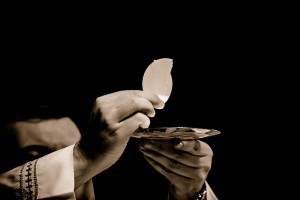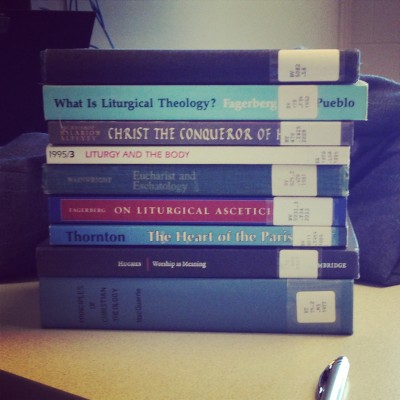Perhaps it’s just me and my upbringing in northern Virginia, but I can distinctly remember thinking the local our Catholic parish was weird because when I received communion there is was always and only a wafer. No wine. Anyone else with me? A few confessions are in order here: first, by “my upbringing” I simply refer to the fact that I was part of a fairly low Episcopal Church and had no personal real commitment to Anglican worship, polity, or anything during my youth. Second, I definitely received communion at a local Catholic parish despite being a baptized Episcopalian. Third, I only attended Saturday evening mass at St. James because I played on a successful, travel soccer team and we often had games on Sunday mornings. Arrest me, I know (alas, perhaps another post for another time).
Seriously though, I often thought to myself growing up—and can unfortunately remember numerous conversations attempting to proselytize others—that the Catholics were both weird and wrong for withholding wine from the Faithful. And the current articles/essays/blog pieces going around about the Vatican saying “no” to Gluten-free bread creates the potential for a seemingly interesting “one kind” situation for those with Gluten intolerance. You can read Sarah Pulliam Bailey here and Emma Winters here on the issue for further information (hint: they both dispel the idea that low Gluten wafers are bad for those with an intolerance).
Fast forward twenty years: I am now an Anglican priest, PhD student in liturgical theology, and I haven’t had communion in both kinds in over 16 months. Why? Because I’m an alcoholic.
Before we go off the deep end here, please read my words clearly: I am not suggesting that all alcoholics in recovery must abstain from partaking the blood of Christ every Sunday. That is way above my pay grade and none of my business. I am also similarly aware that the Vatican has approved the use of mustum (grape juice with less than 1% alcohol content) for use during Holy Eucharist.
That said, being one who partakes of only the bread for 16 months has caused me to reflect on my childhood naiveté and more recent experiences.
You would assume that I would be the first person to insist upon having wine at Eucharist. And no, not because I’m an alcoholic, despite that being the obvious logic! You would make that assumption because my doctoral research is devoted to liturgical theology and what happens in worship, particularly sacramental worship. As I priest I regularly administer the bread and wine, the Body and Blood, to the faithful. Wouldn’t I—nay, shouldn’t I—partake as well?
Here’s what I’ve learned…
- I am not receiving a lesser Sacrament or being robbed of a sacramental experience. My involvement in the Eucharist is the same as it always has been: active, prayerful, grateful, expectant. I’m not missing out on anything by virtue of having only one element instead of two. There is no noticeable shift in my own awareness and no less grace conferred, either.
- The Eucharist, for me, has become more about the giving of thanks rather than the reception or partaking of elements. I have much to be thankful for in my life: an incredibly supportive and loving wife, three amazing children, a business, a PhD program, my sobriety…the list goes on and on. I have the opportunity to give thanks to my Heavenly Father during the Eucharist for this and for so much more. The point of the Eucharist, first and foremost, is for the church to gather for the source and summit of her worship by giving thanks, directing the praise of creation back to Creator, and self-offering before the Lord. Have we lost sight of this in our post-Reformation debates upon substance, change, and consecration?
- The significance of Christ’s presence in the Eucharist is not a matter of elemental change or discovering the moment of consecration. My awareness of Christ’s presence, or at least my openness to his activity and agency in worship has changed. Christ is present in the Eucharist, with his people, in the act of thanksgiving, in the offering of praise and prayer, and in the breaking of bread. Jesus is not somehow absent to me and more fully present to another because I no longer drink from the chalice or intinct my bread. The Eucharist is a whole service, not just one part of something larger. In the prayers of God’s people, in the reading of Scripture, in the sermon, and in Communion, Christ is present. My job is to encounter him there and not to locate him solely in bread or wine.
The focus on Eucharist in one kind or in two shifts radically the meaning of the Eucharist from what it should be. I’m not arguing for an anything goes mentality when it comes to sacramental worship, far from it! I’m advocating for a deeper, more robust, thicker sacramental experience and encounter. I’m learning on a Sunday by Sunday basis, and one day at a time, that Jesus beckons me—and all of us—to his table not simply for bread and wine or Body and Blood but for participation in the wedding feast, joining the Eschatological banquet table in a foretaste, participating in the self-giving, overflowing love of the Trinity.
My appreciation for the Eucharist—and I daresay my understanding—has grown significantly in the last 16 months. It feels as though things have been put into sharper perspective by virtue of opting out of the wine and that primary issues have once again become primary (and therefore secondary issues have returned to being secondary). I’m sure that I’ll have more to say on the subject as I am further changed by the liturgy and my lengthening time in recovery, but at this point I can say that it is “right to give him thanks and praise.”
“Christ has died. Christ is risen. Christ will come again.”[1]
You May Also Enjoy: On Being an Alcoholic and Liturgical Muggles and Losing the Sacramental Imagination
[1] Taken from the 1979 BCP, Rite II.










